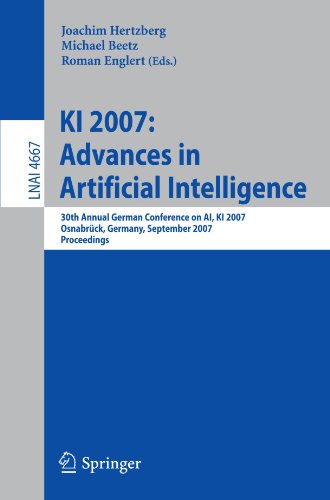

Most ebook files are in PDF format, so you can easily read them using various software such as Foxit Reader or directly on the Google Chrome browser.
Some ebook files are released by publishers in other formats such as .awz, .mobi, .epub, .fb2, etc. You may need to install specific software to read these formats on mobile/PC, such as Calibre.
Please read the tutorial at this link: https://ebookbell.com/faq
We offer FREE conversion to the popular formats you request; however, this may take some time. Therefore, right after payment, please email us, and we will try to provide the service as quickly as possible.
For some exceptional file formats or broken links (if any), please refrain from opening any disputes. Instead, email us first, and we will try to assist within a maximum of 6 hours.
EbookBell Team

4.0
26 reviewsThe 30th Annual German Conference on Arti?cial Intelligence (KI-2007) took place in the University of Osnabru ¨ck, September 10–13, 2007. In this volume, you will ?nd papers or abstracts of its six invited talks, 25 full papers, and 21 posters. The full papers were selected from 81 submissions, resulting in an acceptance rate of 32%. AsusualataKIconference,anentiredaywasreservedfortargetedworkshops – ten of them this year – and two tutorials. They are not coveredin this volume, but the conference Web sitewww.ki2007.uos.de will keep providing information and references to their contents. Some topic clusters are apparent in the overall conference program, which re?ect recent trends in AI research, convolved with foci of work in Germany and Europe. Examples are learning and data mining, robotics and perception, knowledge representation and reasoning, planning and search – all of them including a healthy number of approaches dealing with uncertainty, contradiction, and incompleteness of knowledge. All in all, KI-2007 provided a cross section of modern AI research and application work. KI-2007 also constituted a “small anniversary,” being the 30th exemplar of its kind. The invited talk by Wolfgang Bibel (accompanied by a paper in this volume) picked up on that occasion by recalling what the ?eld of automated deduction was like 30 and more years ago – in general, and in Germany. He also paid homage to Gerd Veenker, who organizedthe ?rst KI conference (which had a di?erent name at the time) in 1975 and whose ?eld of research was deduction.